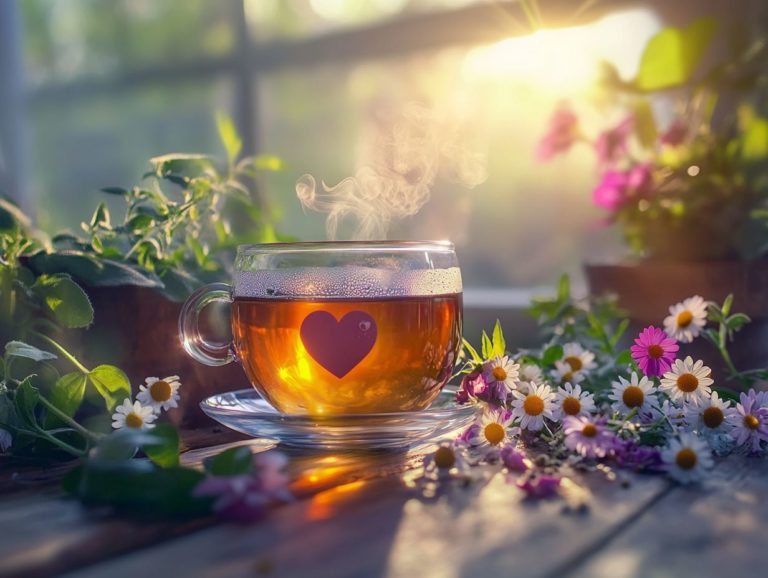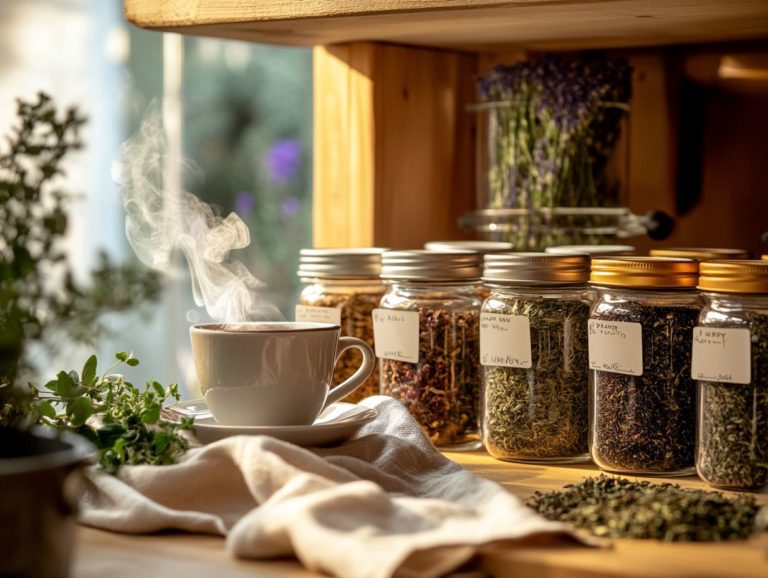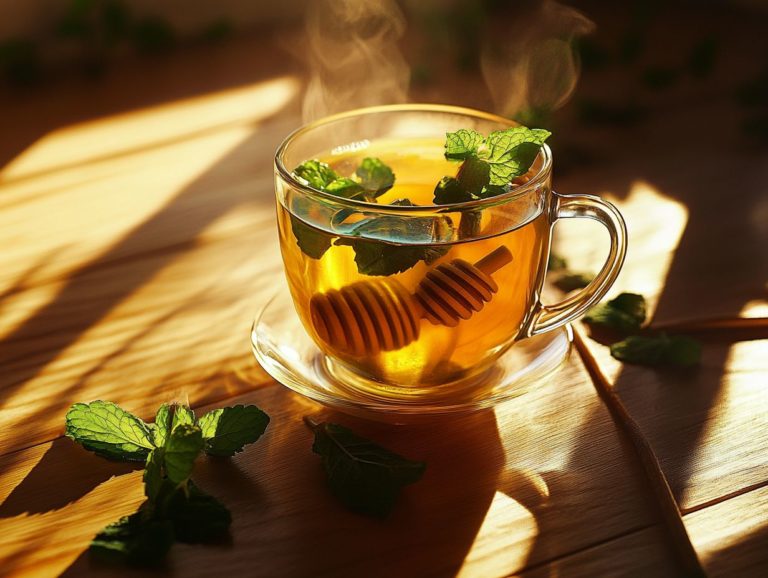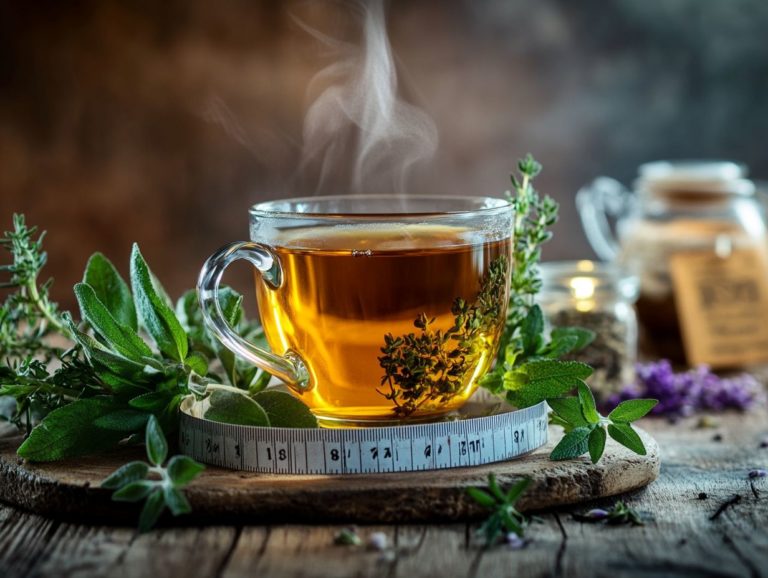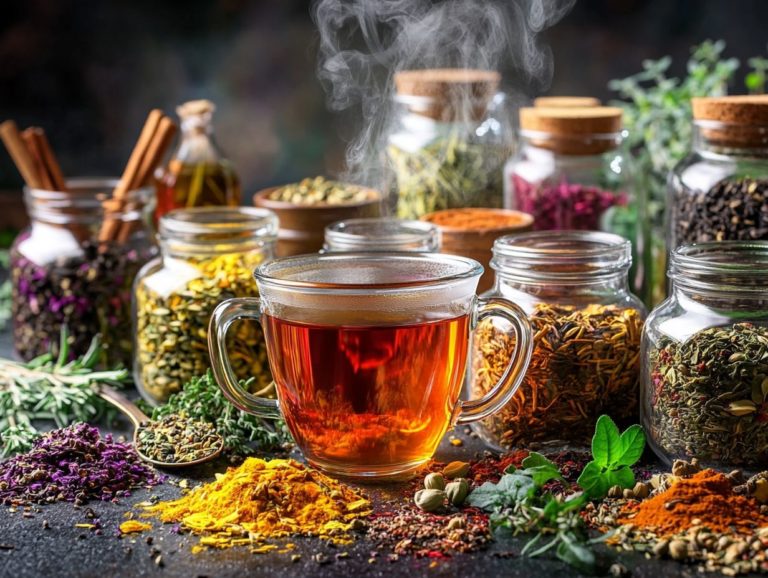How to Spice Up Your Herbal Tea
Herbal tea offers a delightful mix of flavors and aromas. It provides numerous health benefits that tea lovers cherish.
Delve into the myriad advantages of indulging in herbal infusions and tisanes, including popular options like chamomile and peppermint from their calming properties to their remarkable ability to invigorate your senses.
Discover how to select the perfect herbs, elevate flavors with fruits and spices, and craft unique blends right in your kitchen using fresh herbs such as thyme and licorice root.
Whether you’re a seasoned connoisseur or just beginning your tea journey, exciting experiences await you, particularly with a variety of herbal blends and organic teas. Don t miss out on the chance to explore amazing herbal blends that can boost your health!
Contents
Key Takeaways:
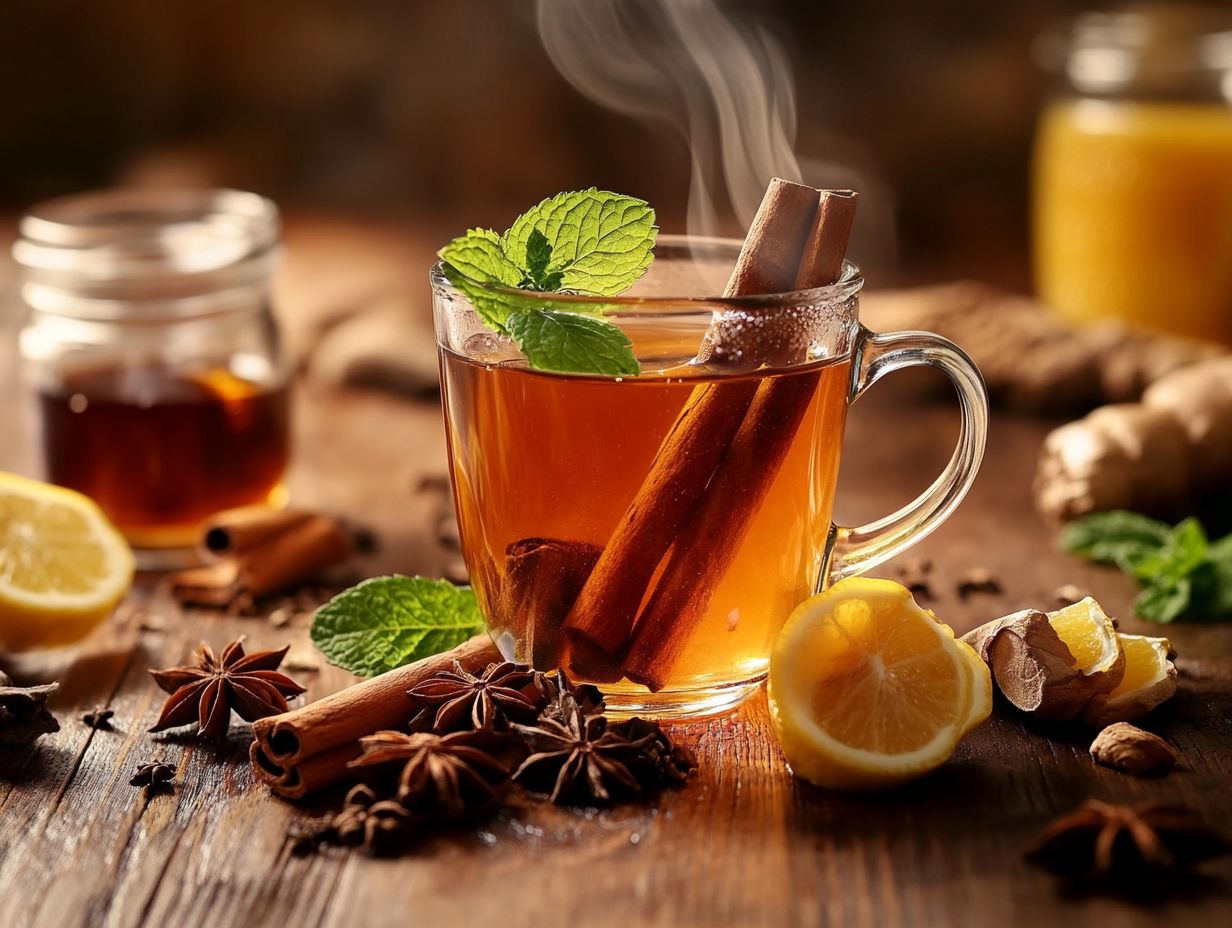
- Explore the world of herbal tea and its benefits, including the wonderful flavors and aromas it offers.
- Choose the right herbs based on their unique uses and properties, and experiment with adding fruits and spices for a more flavorful experience.
- Get creative and make your own herbal tea blends using tips and recipes, allowing you to create unique and personalized flavors for your tea.
What is Herbal Tea?
Herbal tea, often called tisanes, is made from various parts of plants leaves, flowers, seeds, or roots offering a delightful spectrum of flavors and health benefits. Unlike traditional teas, herbal teas are caffeine-free, allowing you to brew a soothing cup with an assortment of herbs like chamomile, ginger, thyme, and peppermint. This makes them an ideal choice for anyone looking to elevate their health and wellness with comforting beverages.
You can enjoy these herbal infusions hot or cold, providing hydration and a cozy experience, especially during those pesky cold or flu seasons.
The origins of herbal tea stretch back thousands of years, traversing cultures from ancient Egypt to traditional Chinese medicine, highlighting their significance in both culinary and medicinal spheres. To truly appreciate these beverages, it’s essential to understand how to choose the right herbs for tea. You’ll find a wide array of herbal blends that incorporate not just single herbs but also unique combinations, offering distinct flavor profiles and enhanced health properties.
Your brewing methods can vary significantly from steeping herbs in boiling water to cold brewing, which extracts delicate flavors without the bitterness. Some herbs, like hibiscus or rooibos, are celebrated for their vibrant colors and tangy tastes. If you’re interested in learning how to use hibiscus in herbal teas, you’ll find it enhances both flavor and visual appeal. Others, such as valerian root, are cherished for their calming effects. This versatility makes herbal tea a wonderful choice for both relaxation and rejuvenation.
Benefits of Drinking Herbal Tea
Drinking herbal tea provides an array of remarkable health benefits, especially when it comes to bolstering your immune system and facilitating recovery from ailments like colds and flu.
Many herbal teas are infused with ingredients with antiviral and antimicrobial properties that support your immune system. Some of these teas are rich in antioxidants and vitamin C, both vital for enhancing your overall well-being.
Health Benefits
Herbal teas are highly loved for their extensive health benefits, particularly in soothing effects and aiding recovery from colds and flu, thanks to their rich blend of antioxidants and essential vitamins. You ll find that ingredients like chamomile and elderberry work wonders with their calming effects. Meanwhile, ginger and echinacea are renowned for boosting your immune system, helping you fend off pesky colds and flu.
Teas like peppermint and thyme offer fantastic respiratory support, relieving congestion and making breathing easier. Then there’s turmeric tea, with its remarkable anti-inflammatory properties that reduce swelling and pain, as well as supporting heart health truly a natural remedy worth indulging in.
Incorporating these teas into your routine enhances your overall well-being, encouraging relaxation and a sense of balance. They bolster your body s natural defenses and promote a healthier lifestyle, benefiting both your physical and mental wellness.
Flavor and Aroma
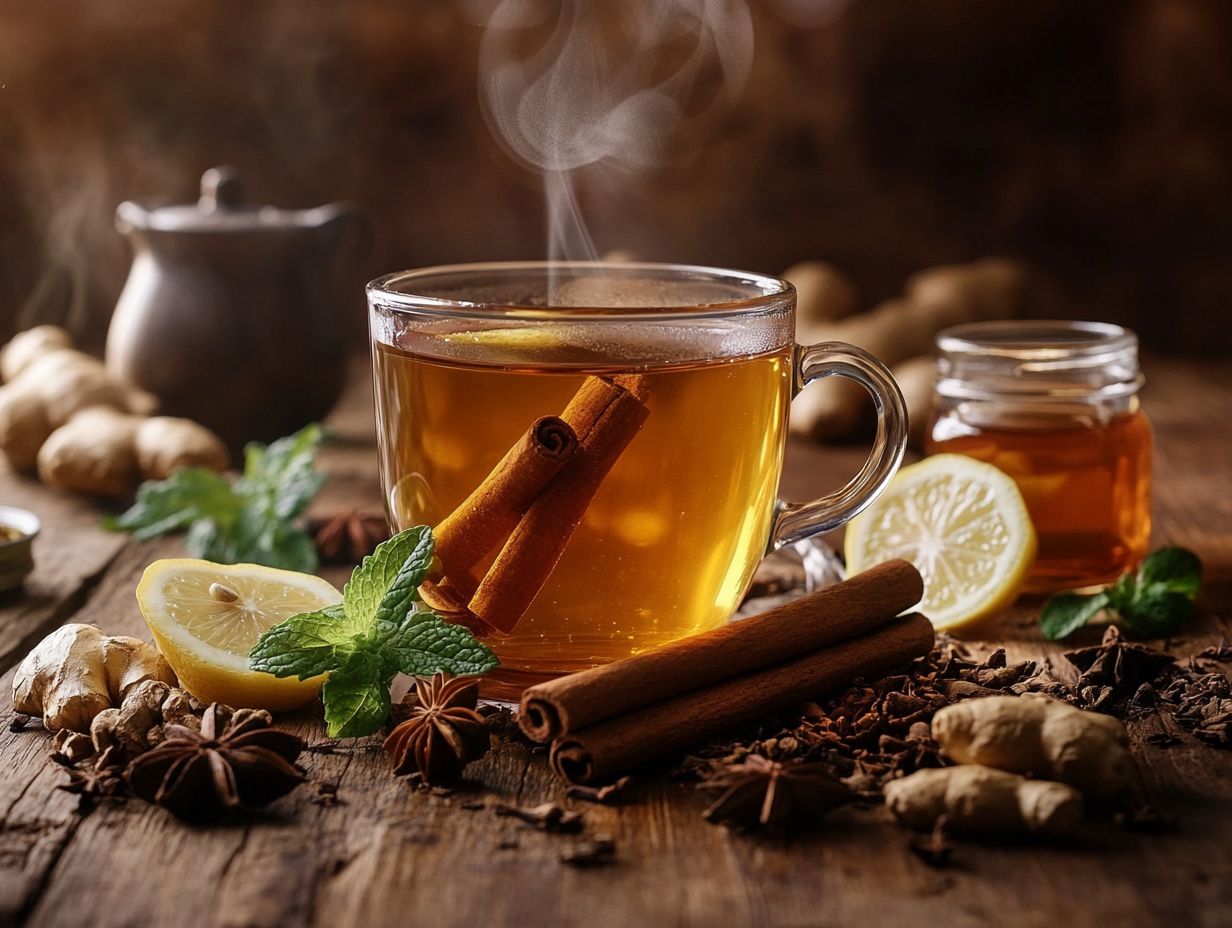
The flavor and aroma of herbal tea are essential in elevating your drinking experience, with each blend presenting a distinct sensory profile. Picture the refreshing zest of peppermint or the soothing notes of chamomile; these diverse flavors arise from a careful choice of fresh herbs, dried tea leaves, and even flavoring concentrates.
Take hibiscus, for instance, which wraps your palate in a tart, cranberry-like embrace, while rooibos greets you with its naturally sweet and nutty character enhanced further by a touch of vanilla or almond. In terms of brewing, remember that the method is key; steeping with hot water ideally around 200 F unlocks the rich essences of these botanicals.
You can enhance your tea with freshly picked herbs like basil or lemongrass; they amplify the aroma and introduce vibrant, lively notes that turn every sip into an exciting experience. To sweeten your creation, opting for honey or agave harmonizes beautifully with herbal flavors, resulting in a well-rounded and thoroughly satisfying tea experience. For more ideas, check out this guide on how to make your own herbal tea at home.
Choosing the Right Herbs for Your Tea
Selecting the perfect herbs for your tea is an art form that profoundly impacts both flavor and health benefits.
With a vast array of options at your fingertips, think chamomile for relaxation, ginger for aiding digestion, and echinacea for bolstering your immune system. Gaining insight into the unique properties of each herb allows you to craft herbal tea blends for every mood, creating a tea-drinking experience that is both personalized and delightful.
Popular Herbs and Their Uses
Several popular herbs are staples in herbal tea blends, celebrated for their distinct flavors and therapeutic qualities. Take chamomile, for instance, renowned for its calming effects. Ginger, with its spicy flair, not only adds a kick but also supports digestion. Peppermint offers a refreshing aroma that can invigorate your senses, while echinacea shines as a go-to for boosting your immune system.
These herbs enhance tea’s flavor and pack significant health benefits that can fit seamlessly into your daily routine. Imagine sipping on chamomile s delicate floral notes to soothe anxiety and promote better sleep perfect for winding down in the evening. Conversely, ginger s invigorating zest makes for an ideal morning pick-me-up, especially during chilly months when you need an immunity boost.
Peppermint s crisp flavor serves as a delightful afternoon refresher and can even help ease headaches. Echinacea, on the other hand, can be brewed as a proactive measure against seasonal illnesses, giving you the power to support your health before issues arise.
Each herb brings its unique contribution to wellness, solidifying their place in countless herbal tea collections. Explore and experiment with these herbs in your own teas!
Ways to Enhance the Flavor of Your Herbal Tea
Enhancing the flavor of your herbal tea can truly elevate your drinking experience, transforming it into a delightful ritual tailored to your palate.
By adding fruits like vibrant citrus or fresh berries, along with spices and natural sweeteners, you can create a beverage that tantalizes your taste buds while preserving its health benefits.
Adding Fruits and Spices
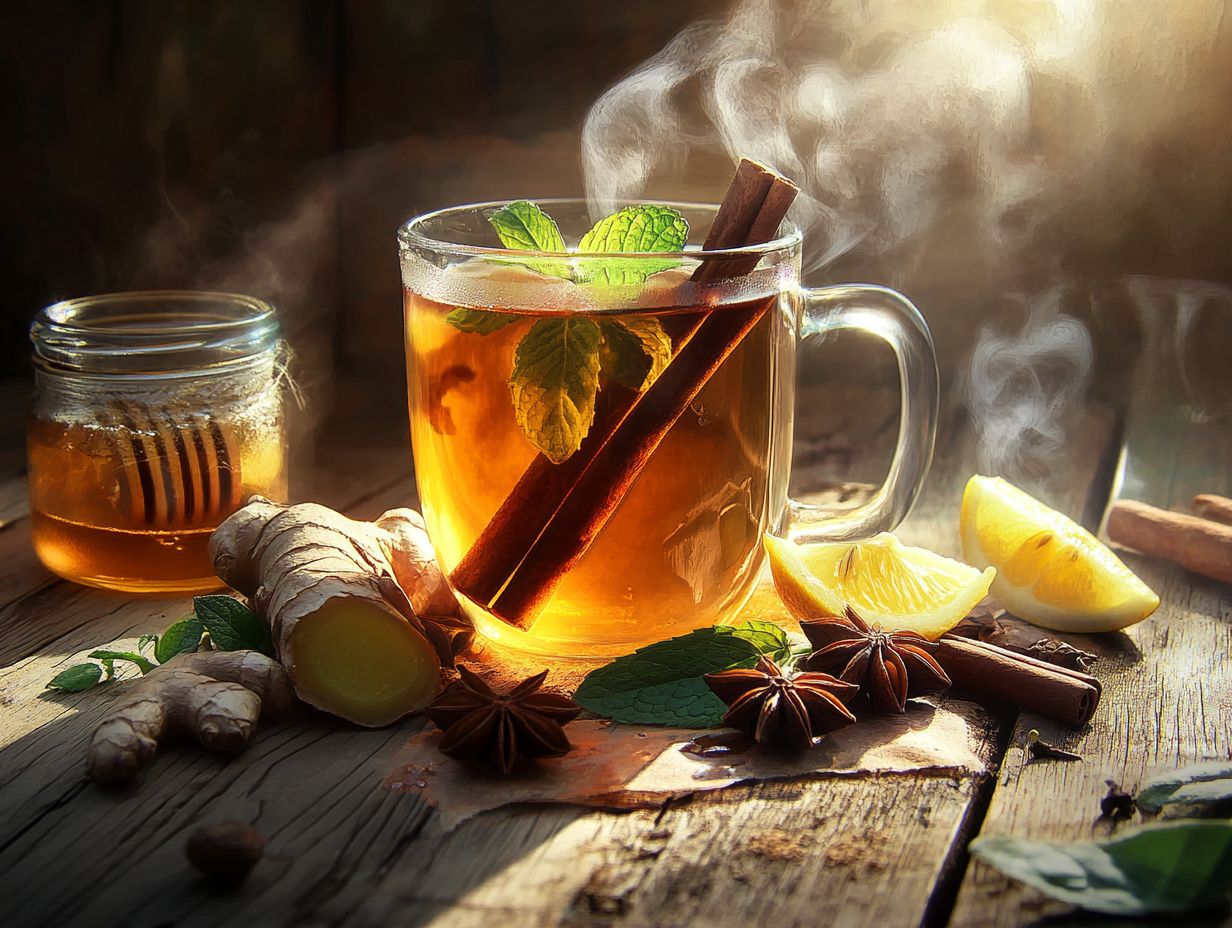
Adding fruits and spices to your herbal tea is a great way to develop a rich flavor while boosting the health benefits of your drink. Imagine the refreshing zing of citrus fruits like lemons and oranges, or the comforting warmth and depth that spices such as cinnamon and cloves can bring to your infusion.
These additions can greatly boost the tea’s health-boosting properties. For instance, pairing ginger with chamomile can aid digestion and promote relaxation. Incorporating berries adds a delightful punch of antioxidants that help protect your body from damage. To enhance your summer experience, try some refreshing iced herbal tea recipes that combine these ingredients!
Imagine the sweet and tart notes of pineapple mingling with peppermint, invigorating your senses and making for a perfect afternoon pick-me-up. With so many combinations at your fingertips, personalizing your tea experience becomes easy, catering to both your palate and health needs. Explore herbal tea variations that ensure a nourishing ritual that revitalizes both your body and mind.
Using Different Sweeteners
Using different sweeteners can transform your herbal tea experience, allowing you to tailor the flavor to your taste. Natural sweeteners like raw honey not only enhance the taste but also offer soothing properties for those pesky sore throats.
Incorporating alternatives like stevia and agave opens up unique flavor profiles while meeting various dietary preferences. Stevia, a zero-calorie wonder, may help regulate blood sugar levels and has beneficial properties. In contrast, agave syrup, with its lower sugar impact, provides gentle sweetness that complements the herbal notes of your tea, making it an ideal choice for those seeking caffeine-free options.
Choosing the right amount is key; typically, one teaspoon of honey per cup works wonders for achieving optimal sweetness with natural sweeteners, ensuring that the medicinal qualities of your tea shine through.
Making Your Own Herbal Tea Blends
Crafting your own herbal tea blends and infusions opens a world of unique flavor combinations while allowing you to customize health benefits to suit your preferences.
By experimenting with a variety of herbs, spices, and citrus fruits, you can create soothing beverages that cater to your specific needs whether it s relaxation, digestion, or immune support.
Embrace the art of tea blending and enjoy a personalized experience that delights both your palate and well-being. Try mixing your favorites for a delightful surprise!
Tips and Recipes for Creating Unique Blends
Creating unique herbal tea blends is a delightful journey. It invites you to explore and unleash your creativity. Begin by considering the health benefits you aim for, selecting complementary flavors that will harmonize beautifully in your brew. Pay attention to the brewing methods and brewing time, as it s essential for the best flavor extraction.
This journey into herbal teas is thrilling! It can be an enriching and enlightening experience for your immune system, allowing you to uncover your personal preferences and flavor profiles. Start with tried-and-true classics like chamomile or peppermint as your base, then elevate your blend by introducing spicy ginger and licorice for warmth or vibrant hibiscus for a refreshing twist. For some inspiration, check out these delightful DIY herbal teas for wellness.
In terms of brewing, remember that brewing times are crucial; a brief infusion might leave you with a lackluster cup of green tea, while overbrewing could bring about unwelcome bitterness in your herbal blends. To enhance your experience, consider trying 5 delicious herbal tea blends. Feel free to adjust the sweetness with a drizzle of honey or a splash of lemon for that extra zing.
Embrace experimentation with organic teas and invite friends to join in the fun, sharing their own concoctions. This enhances your experience and builds community among herbal tea enthusiasts, amplifying both the enjoyment and health benefits of your herbal tea journey.
Frequently Asked Questions
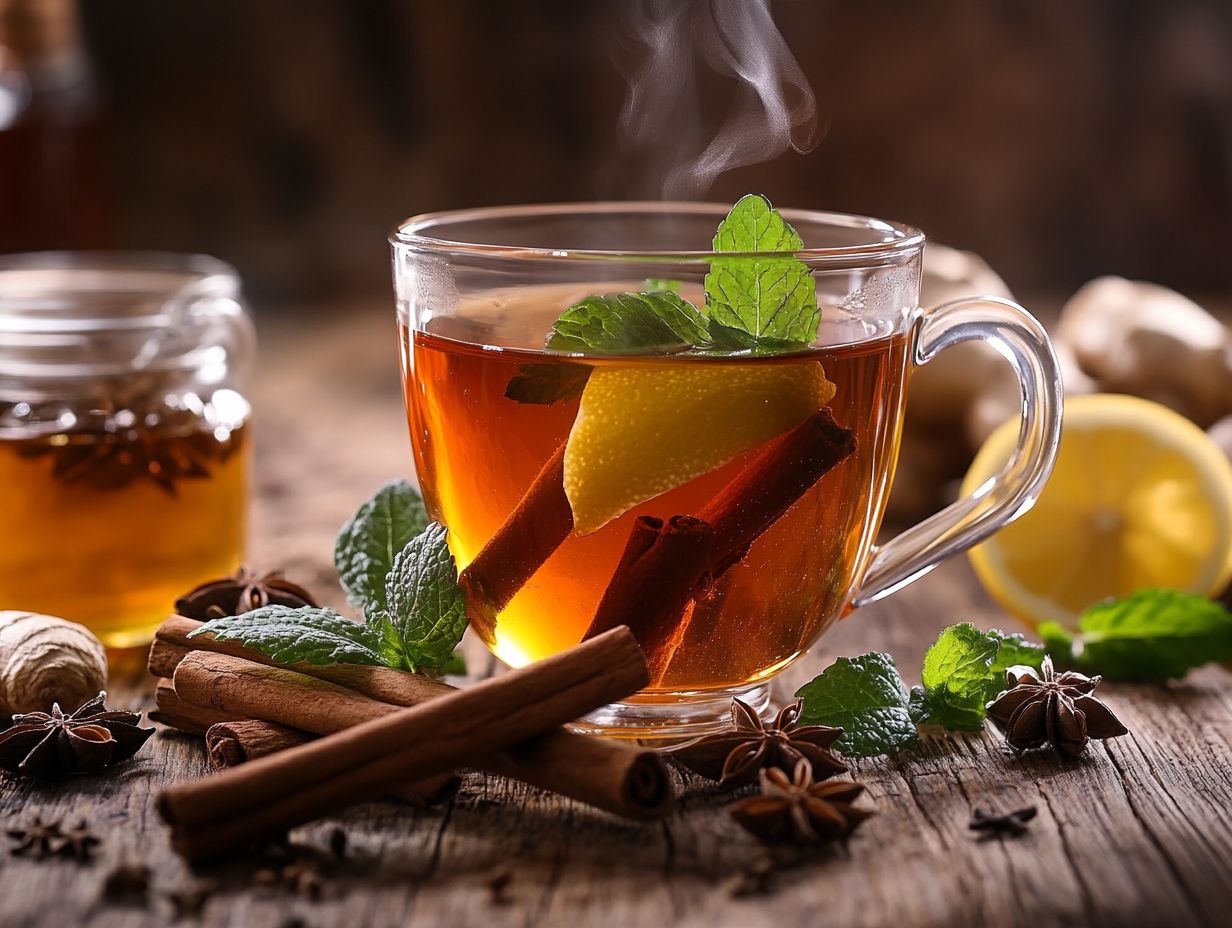
What are some easy ways to spice up my herbal tea?
Adding ingredients like thyme, ginger, or peppermint can elevate the flavor. There are several simple ways to add some flavor to your herbal tea. You can try adding a slice of lemon or lime, a few sprigs of fresh herbs, a dash of honey, or a sprinkle of cinnamon.
Can I use dried herbs to spice up my herbal tea?
Absolutely! Dried herbs such as chamomile flowers or elderberry can add additional health benefits and flavor to your tea. Just make sure to crush or grind them before adding them to release their full flavor.
Is it safe to use spices in my herbal tea?
Yes, as long as you are using common kitchen spices like cinnamon, ginger, or cloves, it is safe to add them to your herbal tea. Just be careful not to overdo it, as some spices can be quite strong.
What are some unique spices I can use in my herbal tea?
You can get creative and try using cardamom, star anise, or even cayenne pepper to add interesting flavors to your herbal tea. Just make sure to add them in small amounts to avoid overpowering the tea.
Can I use milk or cream in my spiced herbal tea?
Yes, you can add some milk or cream to your spiced herbal tea for a creamier texture. You can also try using non-dairy alternatives like almond milk or coconut milk for a different taste.
How can I make a spicy iced herbal tea?
To make a spicy iced herbal tea, brew your tea with sliced jalape o peppers or add a few drops of hot sauce. Chill it in the fridge and serve over ice for a unique and flavorful iced tea.

